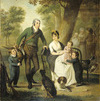Verenigd maar verdeeld. Constitutionele debatten over jacht en eigendom in het Verenigd Koninkrijk der Nederlanden
DOI:
https://doi.org/10.18352/bmgn-lchr.10760Abstract
In this article we analyse constitutional debates on game hunting in the post-Napoleonic Low Countries (1814-1819). We demonstrate that these debates reflect fundamental differences within the United Kingdom of the Netherlands (1815-1830), which cannot be retraced to an a priori division between the Northern and Southern provinces. While a majority in the First Chamber favoured a (semi-)seigneurial system protected by the king, a majority in the Second Chamber based its arguments on a modern interpretation of property rights guaranteed by the Constitution of 1815. Building on the line of thought drawn in a recent study by Rafe Blaufarb, we argue that these debates on the relationship between king and constitution fit into a broader discourse on the (dis)entanglement of public power and private property in post-Napoleonic Europe.
In dit artikel bestuderen we de constitutionele debatten over het jachtrecht in de post-Napoleontische Lage Landen (1814-1819). We tonen aan dat deze debatten een inzicht geven in fundamentele tegenstellingen binnen het Verenigd Koninkrijk der Nederlanden (1815-1830), die niet teruggebracht kunnen worden tot een a priori tegenstelling tussen de Noordelijke en Zuidelijke provincies. Terwijl een meerderheid in de Eerste Kamer een (semi-)heerlijk jachtregime voorstond dat beschermd werd door de koning, onderbouwde een meerderheid in de Tweede Kamer haar argumenten op een moderne invulling van het eigendomsrecht zoals beschermd door de Grondwet van 1815. Voortbouwend op de gedachtegang in het recente werk van Rafe Blaufarb, beargumenteren we dat deze debatten over de verhouding tussen koning en grondwet passen binnen een bredere discussie over de scheiding van publieke macht en privaat eigendom in post-Napoleontisch Europa.
Downloads

Downloads
Published
Issue
Section
License
Authors who publish with this journal agree to the following terms:
a) Authors retain copyright and grant the journal right of first publication with the work simultaneously licensed under a Creative Commons Attribution 4.0 International (CC BY 4.0) that allows others to share the work with an acknowledgement of the work's authorship and initial publication in this journal.
b) Authors are able to enter into separate, additional contractual arrangements for the non-exclusive distribution of the journal's published version of the work (e.g., post it to an institutional repository or publish it in a book), with an acknowledgement of its initial publication in this journal.
c) Authors are permitted to post their work online (e.g., in institutional repositories or on their website) prior to and during the submission process.
Authors are explicitly encouraged to deposit their published article in their institutional repository.








